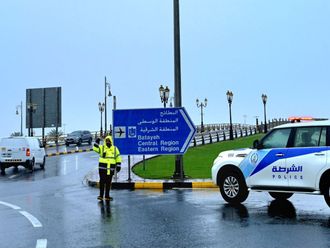Dubai: While 2016 was the hottest year on record for the rest of the world, it was not the case in the UAE although meteorologists caution that the average temperature in the country is gradually increasing.
The World Meteorological Organisation (WMO) last week confirmed in a report that 2016 was the warmest year on record with a remarkable 1.1 degrees Celsius increase in temperature above the pre-industrial period, which is 0.06C above the previous record set in 2015.
In the UAE, Dr Abdullah Al Mandoos, Director of the National Centre of Meteorology and Seismology (NCMS), said that while the temperature is rising in the UAE, 2016 did not break records.
“The trend overall is going up, even in the UAE, but 2015 is the highest record for the UAE, according to historical data that we have,” Dr Al Mandoos told Gulf News.
“The difference is very slight. The annual mean [average] temperature in 2015 was 29.8C, while in 2016, it was 29.4C. Even though we didn’t record the highest temperature in 2016, the average temperature will increase as is the case globally,” he added.
Similarly, in the US, 2016 was the second warmest year following 2012.
Globally, the temperature each year since 2001 has been at least 0.4C above the long-term average for the 1961-1990 base period, which is what the WMO uses for climate change monitoring.
According to the WMO report, global temperatures are rising between 0.1C and 0.2C per decade. The same is true in the UAE.
NCMS also uses climate data going as far back as 1937 for Sharjah, 1974 for Dubai, and 1982 for Abu Dhabi.
The slight year-on-year fluctuations in average temperatures, in this case a difference of 0.4C between 2015 and 2016, may not be “felt” by residents, but there are some sudden changes in weather patterns that can be easily noticeable.
“Each year, there are air masses affecting the general circulation of the air in between the seasons. There are sometimes fluctuations causing extreme weather. Sometimes it could be a hot air mass, or a very cold air mass,” Dr Al Mandoos said.
In February this year, a drop in temperature caused snow in Jebel Jais while the temperature at Al Jazeera Border Gate peaked at 52.1C in 2002.
“People won’t feel this gradual rise in temperatures in the short term, but as a meteorologist, and speaking for the environment, we need to try stop carbon emissions and other greenhouse gases from escaping into the atmosphere not just from factories, but even from individuals and households,” Dr Al Mandoos said. “In the long term, the change will be on the climate itself and these changes will affect the next generation.”










